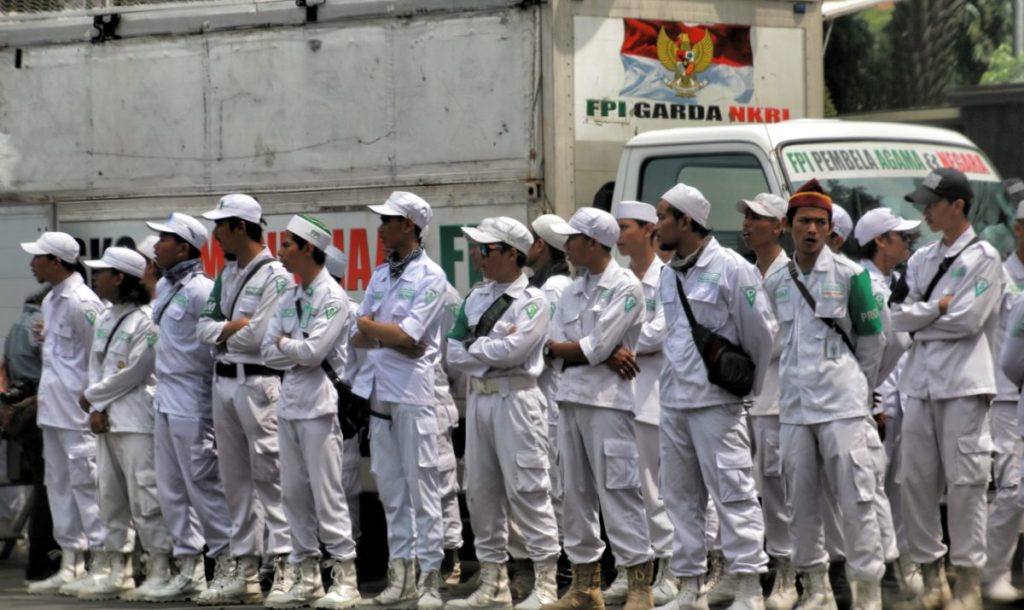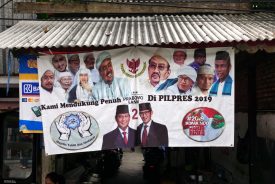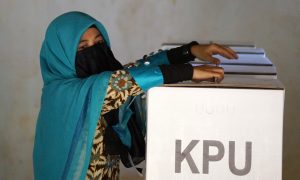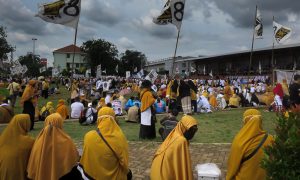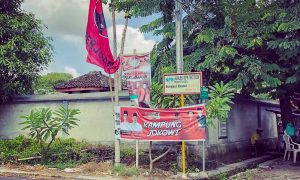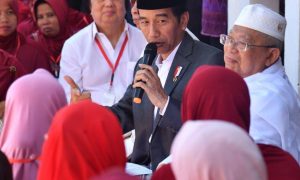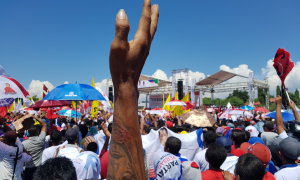Many of the questions surrounding who was responsible for the violence that erupted in Jakarta on 21–22 May will likely never be answered. Prevailing theories suggest roles for a mix of interests and actors, involving paid thugs, religious extremists, opportunists and mysterious gunmen. But there is little clarity on which, if any, of the gaggle of contesting elites may have “masterminded” the unrest, or what precisely they sought to gain from it.
In this respect there are strong resonances with the violence of almost 20 years earlier in May 1998, albeit on a far lesser scale. Then, the still-mysterious shootings of students at Trisakti University and rioting, both orchestrated and spontaneous, left over 1,200 dead and large parts of Jakarta in flames, leading to the resignation of Suharto after 32 years in power. That some of the key actors involved in both the violence of 1998 and 2019 are the same poses unsettling questions about how much has changed in 21 years of reformasi.
One group that emerged out of the turmoil of 1998 was the Front Pembela Islam (FPI). There is significant conjecture over precisely what role FPI played in Jakarta’s most recent violent episode. In many respects this political moment seemed tailor-made for FPI, given its well-trained prowess in capturing political tensions and mobilising these along divisive fault-lines, on which it seeks to capitalise socially and politically. As events unfolded, however, FPI appeared to be caught between contradictory sets of imperatives, its internal divisions and vulnerability to political backlash more apparent than ever.
Outsiders no longer
FPI came to play a central role in Prabowo’s organisational coalition and election campaign in 2019. It had offered conditional support to Prabowo in the presidential elections in 2014, but it was with Ahok’s defeat in the 2017 Jakarta gubernatorial election, and his subsequent conviction for blasphemy, that the alliance consolidated. This was considered a major success by FPI, with its years of agitation, smear campaigns and street-level mobilising finally gaining the recognition and logistical support it believed it deserved. The so-called 212 movement that it had spearheaded provided a strategic template to be reproduced on the national stage, with the main target now being the Widodo administration.
This alliance has helped to push FPI, previously considered a street-based vigilante group, further into the centre of Islamic and national politics. In the wake of Prabowo’s electoral defeat FPI has remained unfaltering in its support even while his political party coalition fragments around him. This is in part due to high-profile roles given to several FPI clerics within his campaign team, not least of which is FPI’s Grand Imam, Habib Rizieq Shihab. In self-imposed exile in Saudi Arabia since 2017 to evade pornography charges, since dropped, Rizieq has featured heavily in Prabowo’s campaigning and been crucial to articulating the parameters of polarisation upon which the election was at least partly fought. His image frequently appeared in campaign banners as a transcendent holy figure hovering above Prabowo Subianto and his vice-presidential candidate Sandiaga Uno, intimating some kind of spiritual guidance.
FPI’s seemingly steadfast loyalty and rhetorical bombast, however, is also tinged with desperation. Having committed so deeply to a Prabowo victory, it now faces the political reality of having nowhere to go, vulnerable to criminalisation by a second-term Jokowi administration not reluctant to use the legal system to target its critics.
Jakarta riots: mastermind or onlooker?
Despite the weeks of build-up amid calls by Prabowo’s coalition for a “people power” movement to overturn what they claim was an election result marred by systematic corruption, initial protests outside Bawaslu (the elections watchdog) were, for their organisers, disappointingly small. Rizieq’s calls for preparatory “defend the nation” committees to be established around the country also failed to gain traction, and beyond the several thousand who gathered in central Jakarta there was little in the way of critical mass elsewhere in the rest of the country. Efforts by police to block convoys of protestors heading to Jakarta were relatively successful, combined with the impact of calls from Nahdlatul Ulama and Muhammadiyah forbidding members from attending.
Questioning Prabowo’s alliance with Islamists
Disputes that mark this pragmatic alliance should worry Islamists that Prabowo may disregard their demands.
While on the ground local FPI clerics joined with police in a vain effort to hold back rioters, FPI’s laskar militias appeared largely absent, posing questions over whether they were unprepared for what transpired or deployed elsewhere. It is worth noting that it is has long been an established “policy” within the organisation that FPI members only wear uniforms and attributes for humanitarian or advocacy work, whereas violent “sweeping” operations are done in “civilian” clothes. This is in order to give the impression vigilante action is a “spontaneous” reaction of the community and provide a degree of deniability if things get out of hand.
In the aftermath of the violence, FPI’s Jakarta branch leadership issued a press release claiming it was the victim of an elaborate set-up, citing unnamed “provocateurs” intent on implicating FPI in the violence by bringing the rioting to their organisational heartland in Tanah Abang. Habib Muhsin Alatas from FPI’s central advisory board called it “part of a scenario to wipe out FPI”.
Yet while these Jakarta-based figures initially shared conciliatory ground with the police, this was promptly obliterated in a statement from Rizieq released on 28 May, in which he claimed that the police, not “provocateurs”, were solely responsible for the violence. The eight who lost their lives in the rioting, including three FPI members, were heralded as martyrs. Singling out Brimob, whose dormitory near FPI’s headquarters had been attacked, Rizieq accused the police of gross human rights violations, arguing that “proportionate” retaliatory violence was legitimate.
A victim of its own success?
Despite Rizieq’s inflammatory grandstanding, the implications of the violence for FPI are strategically unfavourable.
FPI’s influence and popularity has expanded significantly in the wake of the anti-Ahok and 212 mobilisations, but this has come with some costs. One has been a reduced presence in Jakarta’s neighbourhoods and streets. FPI began as a street-based vigilante group deeply embedded in local social and economic life, but has over time shifted to an emphasis on high-level political brokering and on-demand displays of symbolic militancy.
At the same time as its capacity to draw together a more demographically and ideology diverse array of people has increased, it has relinquished some of its grassroots presence, no longer possessing the same level of local infrastructure as groups such as Forum Betawi Rempug or Pemuda Pancasila, both of which shifted their political support from Prabowo to Jokowi in what now appears to be a more astute strategic calculation of political fortunes.
This has several implications for understandings of the dynamics of the Jakarta riots. One is that FPI have had to rely heavily on mobilising branches in Bekasi, Bogor and Banten, as well as parts of West Java such as Tasikmalaya and Majalengka, to bolster its numbers for Jakarta-based demonstrations. The high profile of Habib Rizieq as an oppositional Islamist figurehead in exile has become a drawcard but has also produced shifts and tensions within the organisation. FPI has long worked as an umbrella able to accommodate everyone from street gangsters to the more ideologically militant. The political expediency of the Jakarta branch’s leadership has, at times, grated with the stridency of some regional branches, who may have come to Jakarta with the intent of forcing Bawaslu to overturn the election results, just as Rizieq’s rhetoric had implied they should.
This speaks to a broader problem of FPI becoming a victim, of sorts, of its own success, with its rhetorical extravagance outstripping its organisational capacity to exercise effective control over what is done in the Grand Imam or the organisation’s name. As several media reports have indicated, teenagers involved in the rioting with no apparent organisational link to FPI cited Rizieq’s declarations for “constitutional jihad” and a “people’s uprising” as a literal call to arms. While FPI leaders may apply their own version of plausible deniability, a disjuncture was evident in the Jakarta branch’s initial claims of outside provocateurs having been responsible for the unrest, and Rizieq’s allegation that it was entirely due to police brutality, in response to which violent retaliation was religiously ordained, if not obliged.
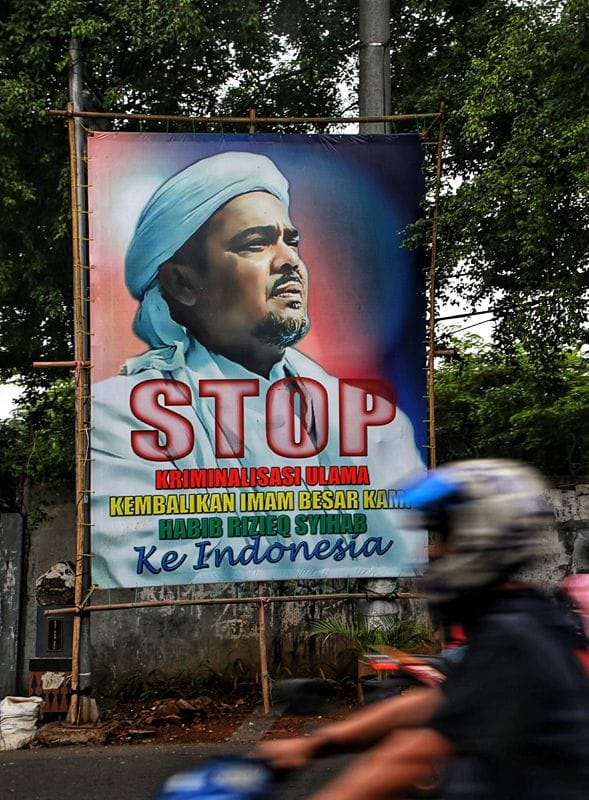
“STOP CRIMINILSATION OF ULAMA—BRING OUR GRAND IMAM BACK TO INDONESIA” reads this banner. (Photo: author)
Payback time
The contradictory role and rhetoric of FPI also has much to do with timing. FPI’s status as a legally registered social organisation, or ormas, expires in mid-June. In order to gain re-registration it is required to submit a request for consideration by the Ministry of Home Affairs, which may approve or reject the request. Since this impending deadline became known, there has been significant public pressure on the government to reject any application for renewal, including an online petition signed by over 470,000 people. As of the time of writing, FPI has yet to submit a formal request for registration renewal. There is no shortage of evidence spanning the organisation’s tumultuous and frequently violent 20-year history on which to base a rejection. Conspicuous involvement in instigating violent civil unrest would provide an obvious and popular rationale for a rejection—hence FPI’s disavowal that it was responsible for violence, but not a disavowal of violence itself.
To lose its ormas status would cast FPI into a space that it has worked strenuously to avoid. A defining feature of FPI’s particular brand of Islamic militancy has been its ability to straddle the ideological, legal and political grey zone between mainstream political player and hardcore militant organisation. This is most evident in its signature concept of “NKRI bersyariah”, which combines the indelibility of the unitary republic—or Negara Kesatuan Republik Indonesia (NKRI), a cornerstone of Indonesian nationalism—with the Islamist ideal of an Indonesia governed by Syariah and the authority of ulama.
The fate of FPI’s Grand Imam, Habib Rizieq Shihab which for some time hung in the balance, now appears largely sealed. Since the beginning of his self-imposed exile Rizieq has seen out several criminal charges against him, all subsequently dropped. Whereas Prabowo had promised to fly Rizieq back to Indonesia on his personal jet if he were to win the presidency, Jokowi’s re-election will likely mean his hiatus will remain indefinite. In case there was any ambiguity on this front, on 14 May Rizieq was issued with a summons for questioning over allegations of subversion, or makar.
This may see increasing stridency in Rizieq’s rhetoric as he seeks to consolidate his position as a de facto Islamic leader forced into exile by a tyrannical anti-Islamic regime, at the same time as FPI leaders in country pragmatically attempt to negotiate their way through the current political impasse.
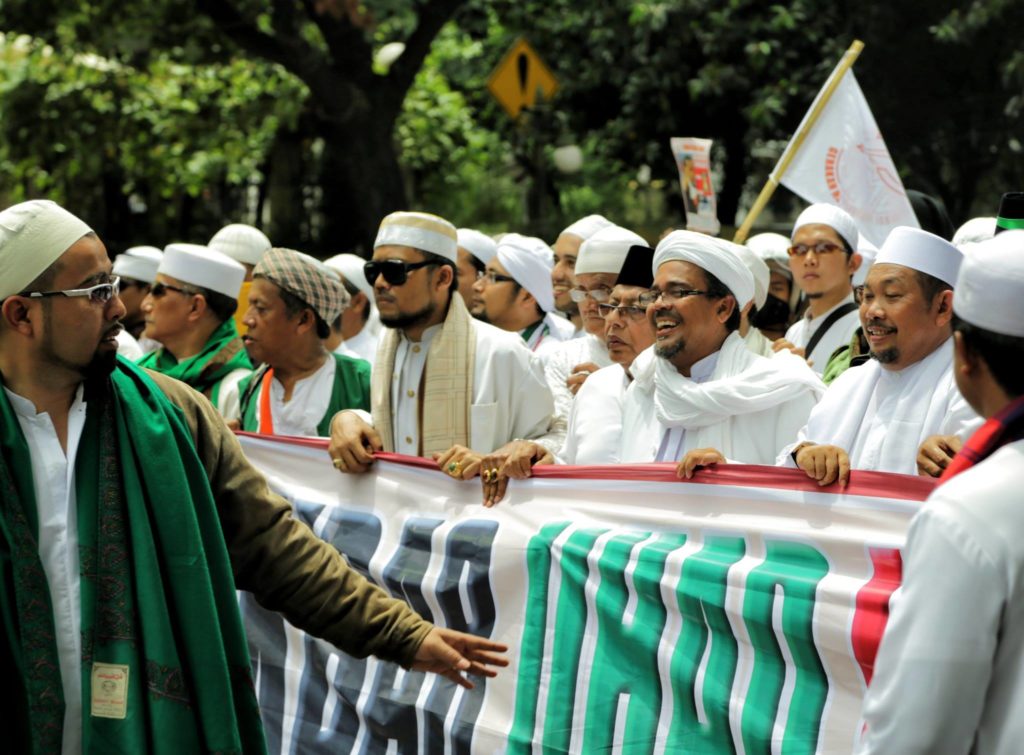
Habib Rizieq Shihab (front, second from right) at a demonstration in 2014. (Photo: author)
What’s the future for FPI?
The convergence of its impending ormas registration renewal deadline, together with a decisive moment for the political alliance on which it has staked its survival, has drawn to the surface tensions between the disparate interests that have congregated under FPI umbrella. FPI has historically benefitted from government crackdowns, as it provides proof proper of its martyrdom in defence of the faith.
Many among the FPI’s ranks, however would be deeply unsettled by the prospect of it being de-registered. This includes local clerics who have used FPI to bolster their religious authority. Other hard-line factions within the organisation would potentially relish the prospect of FPI transforming into an authentically militant underground network. This could arguably push a convergence of FPI and those already residing on the ideological fringes, including former members of Hizbut Tahrir Indonesia, which was banned by the Jokowi administration in 2017.
Ultimately, the events of 21–23 May exposed FPI as neither able to bring out large, disciplined, and organised crowds on demand when most needed, nor seemingly able to provide adequate protection from rioters—even in the midst of the holy month of Ramadhan that it has made a name seeking to protect. To the extent the FPI had a hand in the Jakarta riots, it appears to have made a strategic miscalculation, as the organisation faces an impending existential crisis.
 Facebook
Facebook  Twitter
Twitter  Soundcloud
Soundcloud  Youtube
Youtube  Rss
Rss 